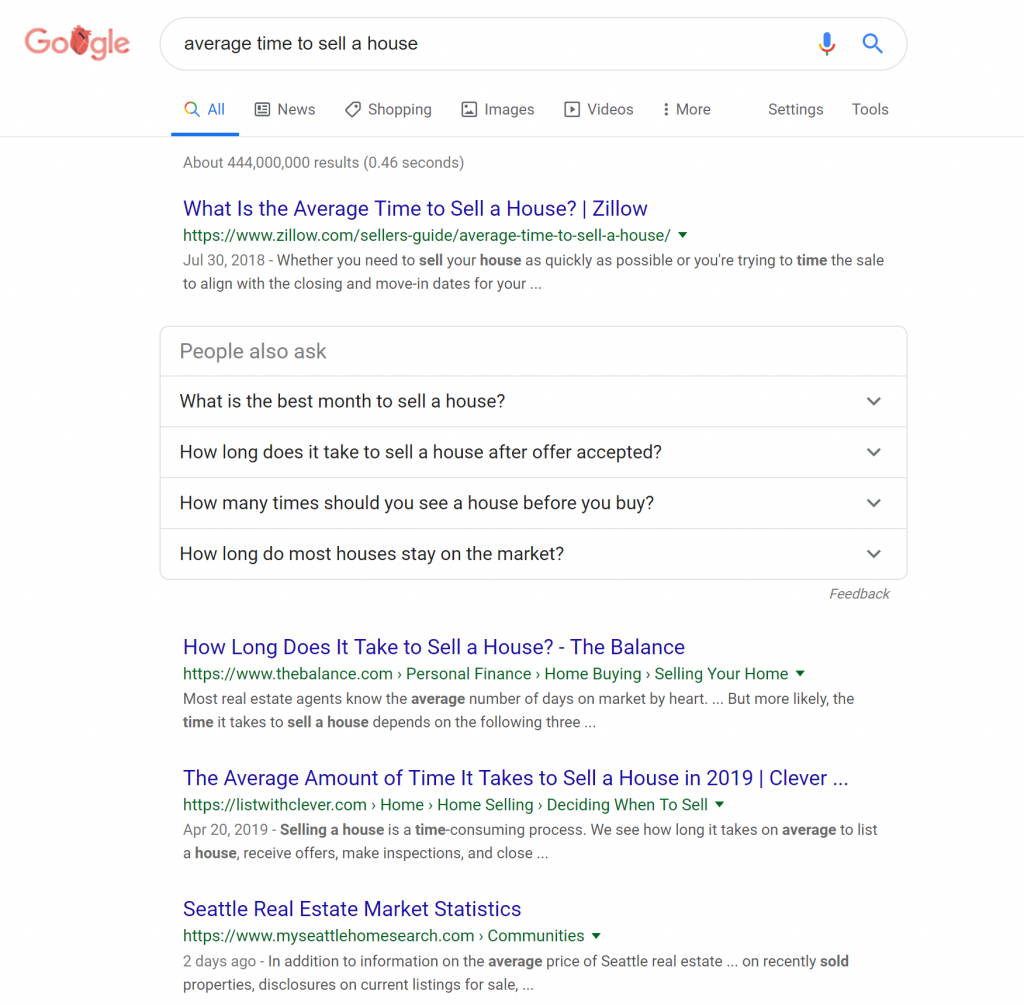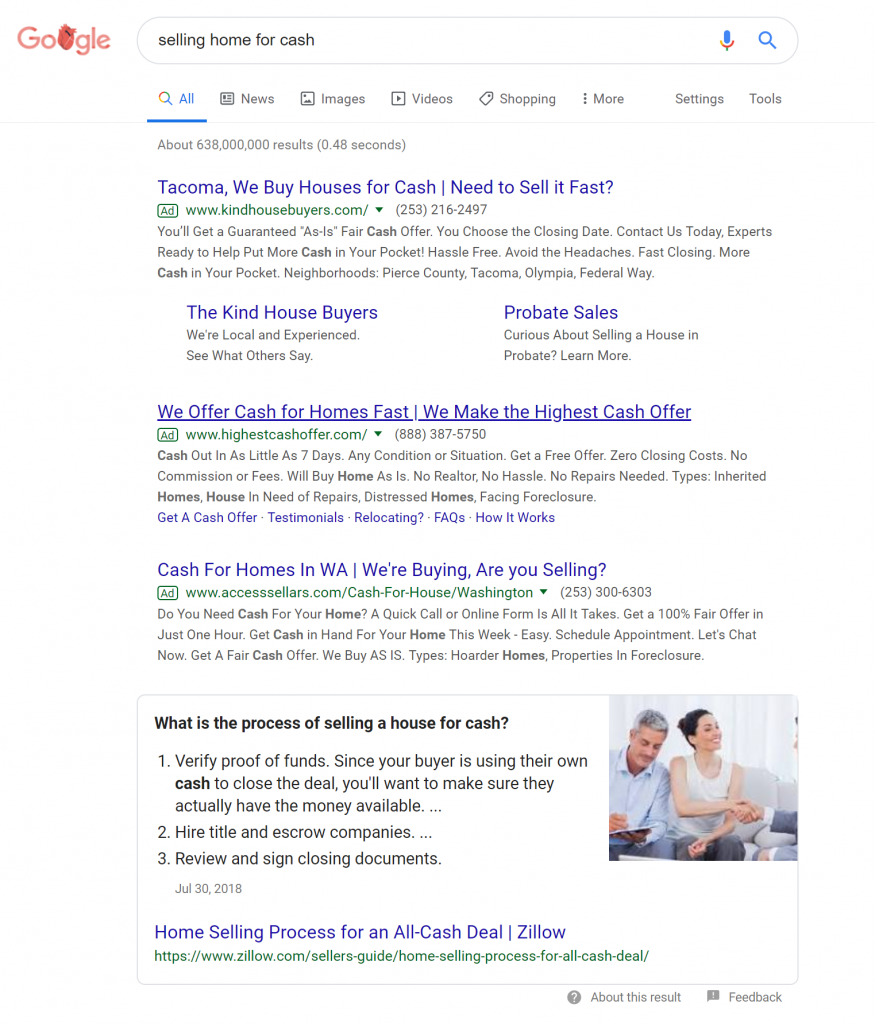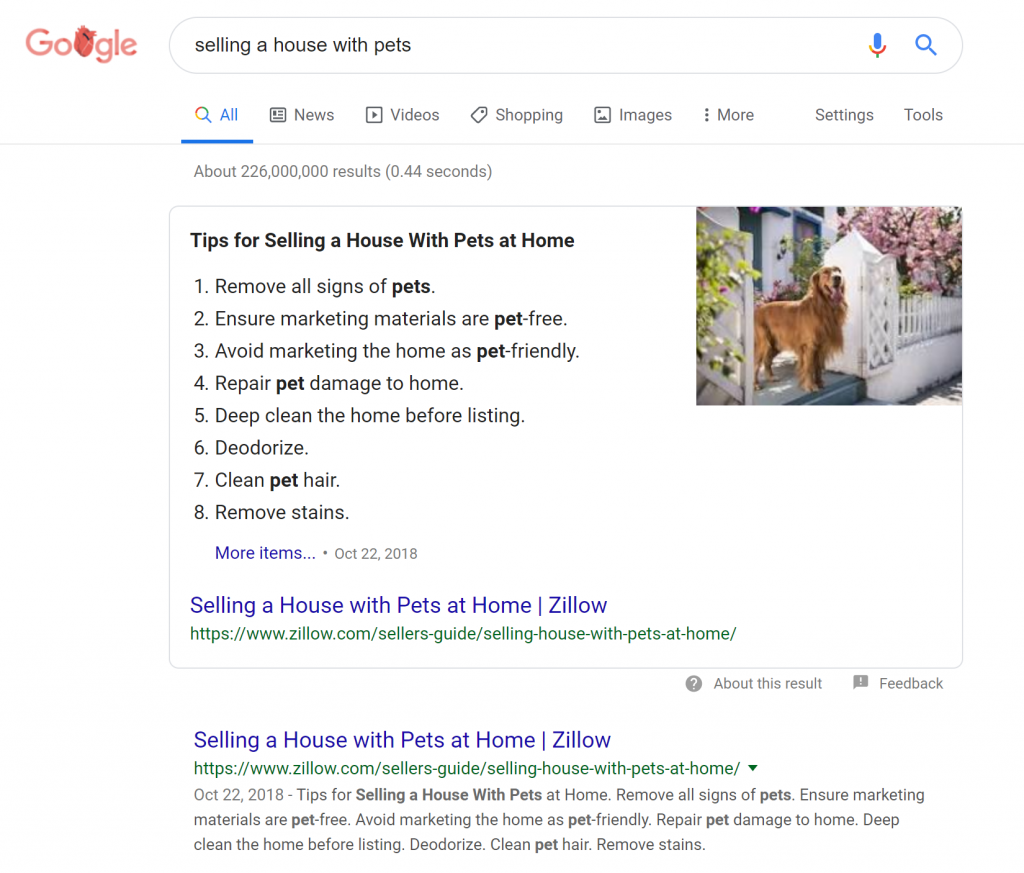10 min read
Real Estate SEO Guide for Agents
To build an online presence as a real estate agent, optimize your website with search engine optimization, or SEO. Learn now.

In this article:
In today's digital world, more and more home buyers and sellers are finding their agents — and their homes — online. According to the Zillow Group Consumer Housing Trends Report 2018, 79% of buyers use online resources to search for a home. To build your online presence and help shoppers find you among the long list of agents, you need to optimize your website so that it appears higher in search results. This is known as search engine optimization (SEO).
What is SEO?
SEO is the process of increasing the quantity — and quality — of traffic to your website through online searches. A well-executed real estate SEO strategy will give your website increased visibility and help drive more leads.
Example: If a seller searches for 'average time to sell a house' on Google, Google will return a list of websites. This list is known as a search engine results page, or SERP, and features the most relevant content for that phrase.

These results are known as organic traffic because they are free and not referred by any other website through search engine marketing (SEM).
What is SEM?
SEM is a technique that increases your website's visibility on a SERP through a form of paid advertising. SEM results will appear above organic search results for the keywords you specify, along with a small icon that indicates the result is an ad.
Example: here are three SEM results for the phrase 'selling a home for cash'.

Common SEO terminology
You don't have to be a real estate SEO expert to increase conversions, improve your return on investment and target quality leads. However, there are a few terms you need to become familiar with. Here's some terminology that's essential to executing a real estate SEO strategy:
- Search volume: The number of searches for a specific word or phrase. Search volume is a good way to see which keywords are popular — you'll be able to compare similar phrases and target the ones with the highest search volume.
- Keywords: Phrases that people type into a search engine. Once you figure out what keywords you want to rank for, you can integrate them into your website's content.
- URL: A web address. It should be formatted with lowercase letters and use hyphens rather than spaces between words. A URL should include your page's main keyword, but can omit "stop words" (like "a," "and," "or" and "is") and ellipses.
- Headers: Section titles on a page. An article typically has three tiers of headers — H1, or page title; H2, or subhead; and H3, or minor subhead. Headers are typically prioritized by search engines, so they're a good place to include your keywords.
- Page title: What appears in your browser tab and in the SERP. A page title should generally start out with your H1, followed by a vertical bar ("|") and your agent or company name.
- Meta description: What people see underneath your page title on a SERP. A meta description is typically what compels a searcher to click on your page, so you'll want it to include some of your keywords (incorporated into sentences) to show searchers that your content is relevant. Meta descriptions should be around 155 characters.
- Featured snippet: An instant answer to a keyword that's sometimes shown at the top of a SERP. A featured snippet is taken from a high-ranking website and is usually displayed in paragraph form, but sometimes can be shown as a list or table.
- Graphics: Visual elements like pictures, charts and videos. Search engines can't see what's in a graphic, so it's important to write alt text.
- Alt text: A sentence (100 characters or less) that's attached to an image and displayed when the image can't be rendered — or when someone is accessing your page with assistive technology like a screen reader. Most people never see alt text, but search engines do, so you should always try to write alt text that contains a primary keyword.
Common SEO myths
There are many misconceptions about SEO. Here are two of the most common myths:
More keywords are better. To a point, yes — make sure to include your targeted keywords in your content (and be sure they fit into the sentence and read naturally). But search engines can tell when you're 'keyword stuffing' and you'll get bumped down in the rankings because of it. If you simply type 'best real estate agent in Seattle' 100 times in a row, your page will not rank well for that term — because there's no useful content to go with it.
Social media, SEM and email newsletters affect SEO. This content won't directly help your ranking on a SERP. Search engines do see how much traffic your website has, so if your social, SEM or newsletter content drives lots of website traffic, then your SERP ranking may increase because of it. Make sure to develop a real estate digital marketing strategy that includes this type of content in addition to SEO.
6 real estate SEO tips for agents
Now that you've got the basic terms down, here are six real estate SEO tips to improve your website's SERP ranking:
- Use keywords that target relevant leads.
- Target local real estate traffic.
- Optimize your listings.
- Develop a content strategy.
- Make your website mobile friendly.
- Link internally and externally.
1. Use keywords that target relevant leads
When searching for real estate SEO keywords to use, make sure they align with your page's content. This will help ensure you attract the right audience — which is crucial to finding new leads and turning them into clients. Keywords should be chosen based on what your target audience is searching for, rather than what has the largest search volume. There are two primary types of keywords:
Head keywords usually have a high search volume and are extremely competitive among high-authority websites. For example, 'home' and 'real estate' are head keywords.
Long tail keywords are, well, long. They allow you to target a very specific audience with a specific need. 'Selling a house with pets' is a long tail keyword — and you can see how it might help you find clients better than a head keyword like 'home.'

Not only are you less likely to appear in search results for head keywords, you're also less likely to get clicks from relevant searchers who are looking for a home or agent in your area. By targeting the right real estate long tail keywords, you may be targeting fewer people, but those people will be much more likely to find (and visit) your website. Selecting and using relevant keywords is crucial to the success of your real estate SEO strategy and helps you convert leads into clients.
How to find keywords
In short: keyword research. Think of a topic or idea that relates to your industry knowledge, a community group discussion, or a product or service that you offer. Identify groups of keywords that you think relate to that topic, jot down these variations in a spreadsheet and then use a keyword tool to figure out the best real estate keywords. You'll be able to compare search volume and the number of search results, which will give you an idea of how competitive each long tail keyword is. Some free real estate SEO keyword tools are:
Where to use keywords
- Page title
- URL
- Article title (H1)
- Subheads (H2s and H3s)
- Meta description
- Image alt text
- Image file name
- Body content
2. Target local real estate traffic
A new real estate agent starts out by building a network, or sphere of influence, in their city. The same is true when you're starting out with real estate SEO. Don't dive in and try to compete with every real estate agent out there — your first step is to help people find you when they search for long tail keywords specific to your real estate lead farming area.
Places to optimize for local real estate SEO
- Website content
- Your website's bio or contact page
- Digital advertising platforms
- Your social media bios
Examples of local real estate SEO keywords
- Three-bedroom homes for sale in
- Family-friendly neighborhoods in
- Best neighborhood schools in
3. Optimize your listings
Implementing SEO for real estate listings is important if you list properties on your website. Make sure they're optimized to appear in SERPs within your target real estate market, which will help you attract buyers and sellers who are more likely to become your clients.
Here's how to optimize your real estate listings for SEO:
- Include the listing address.
- Write a unique listing description for each property.
- Optimize the alt text and names of each image with search keywords.
Build off your SEO discoverability by joining Zillow Premier Agent. Your listings will have exposure on Zillow and Trulia and you'll be able to create a record of past clients.
4. Develop a content strategy
Content plays a huge role in SEO real estate marketing. Make sure your content is informative, easily shareable and supported with data and relevant keywords.
Here are our tips for SEO content success:
Be informative
Provide content that directly answers home shoppers' questions. Find out what questions are being asked and write blog posts that clearly answer them.
Include keywords
If you don't include (the right) keywords, you won't appear high on SERPs. Keywords can also be used to help identify what content your audience engages with, so you can decide what you should focus on.
Since long tail keywords make up 70% of search traffic, using them strategically can help you drive traffic to your website's blog posts.
Include statistics and data
Statistics and data are a great way to establish your credibility and back up your information. Websites that cite credible sources are likely to keep readers engaged, and the time each reader spends on your website directly affects your search result ranking.
Add graphics
You already know that audience engagement is key. Graphics draw attention and help keep people on your page, and sometimes they're an easy way to explain a topic or show an idea. Just make sure to optimize your image names and alt text so search engines know that your graphics contain relevant content.
Real estate SEO content ideas
You can write about anything related to real estate — and even things related to the community you work in. Some real estate SEO content ideas:
- The best schools and neighborhoods in your area
- Testimonials from past clients
- New restaurants and shops in your area
- Community events, news and market updates
- Interesting landmarks or attractions in your area
- Local sports news
5. Make your website mobile friendly
More and more people are using smartphones and tablets — in fact, 44% of sellers use mobile devices to get help selling their homes online — so it's important to make sure your website provides a smooth user experience when viewed on a smaller screen. Because time on page directly affects SEO for real estate agents, you want people to be able to read your content on any device. Try these tips to ensure you have a mobile-friendly website:
- Check that your content shows up properly on multiple devices, like a computer, tablet and phone.
- Check that content loads quickly on different devices — and can be accessed on both Wi-Fi and cell service.
6. Link internally and externally
An internal link is a hyperlink that points to another page on your website, while an external link will take your reader to a third party's page. Both internal and external links are useful when building out your content and executing your real estate SEO strategy. Consider:
- Linking to external materials that support your content
- Linking to your website's homepage or to other blog posts when relevant
- Trying to earn links to your page from other websites — you can do this by creating high-quality, shareable content
For more articles, tips and information on converting leads as a real estate agent, visit the Zillow Premier Agent Resources page.
Tips for top-performing listings
Backed by new research, this guide reveals what today’s top listings do differently to capture buyer attention and outperform the rest.
Learn more

